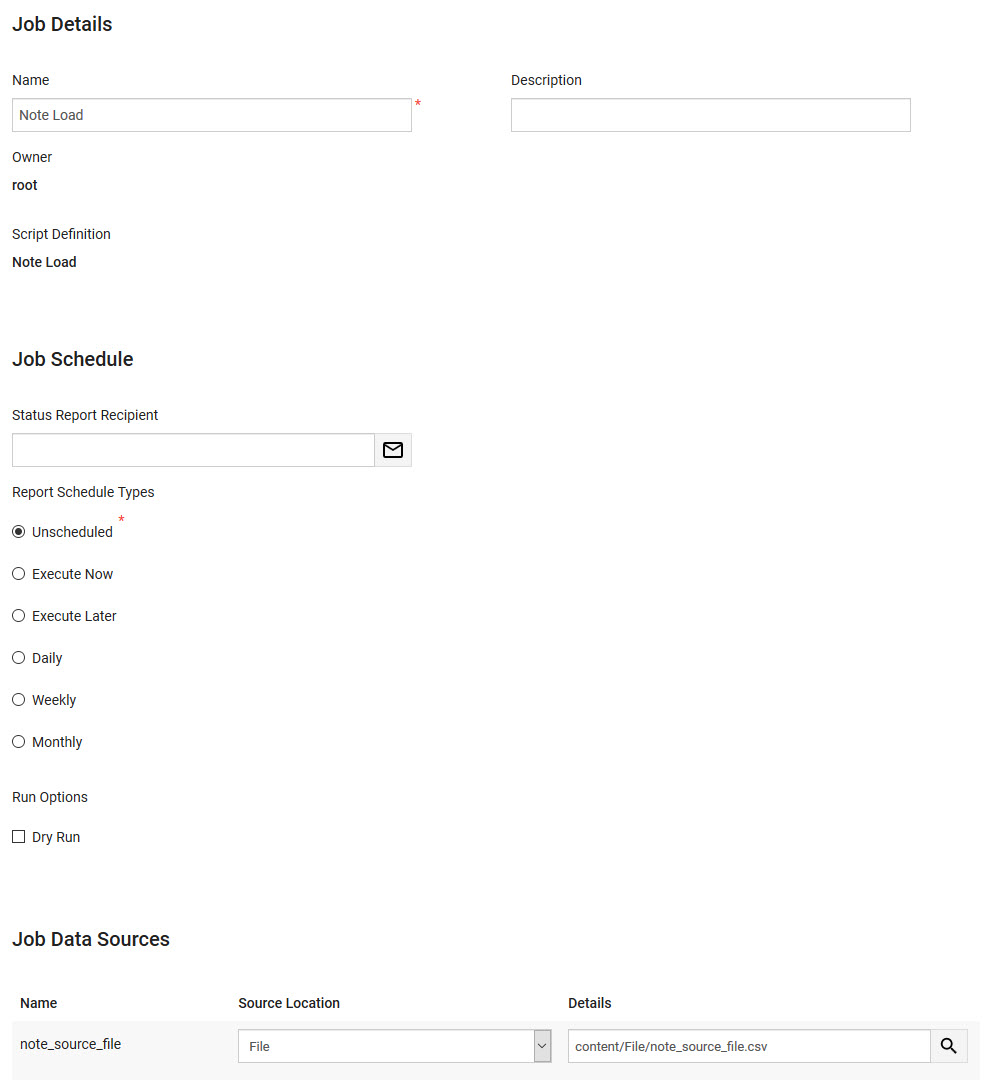•Creating and Executing the Data Management Job
•Data Management Configuration
Summary
Script Name |
Note Load |
|
Minimum Supported Version |
7.12.0 |
|
Source Type |
Single Source |
|
Script Definitions |
Note Load |
|
Use Case
Note Load script adds customer, event, user, order and fund notes.
Configuration Prerequisites
If fields referenced in the script do not have 'Writable' set to Yes, the script will still run successfully but those fields will not be updated. For more information, refer to Configuring Marketing Data Fields.
Source File Format
This script is run using a single .CSV or BI (saved as a text/csv 'Extract Tempate') source file.
The following image illustrates the structure required for the notes_source_file:

The script supports all of the fields available to notes.
The following table outlines the field mapping that needs special handling:
Column |
Required? |
Source Column Header |
Field Name |
UI Field Location |
1 |
Yes |
note_source_key |
Used as a Source Key Column (Key to uniquely identify each record in the Source File) |
General Configuration - Script Definition|Edit page |
2 |
No |
parent_type |
None |
Bound to the note parent types list: •Customer: 12 •Performance: 13 •User: 14 •Order: 25 •Fund: 100 |
3 |
No |
parent_name |
None |
The following are valid values: •number •legacy_number •id •name •customer_reference_code •customer_reference_code2 •customer_reference_code3 |
4 |
No |
parent_value |
Can be number, name or id |
None |
5 |
Yes |
note_type |
type |
Notes/Type based on where the note is created (customer, order, event) |
6 |
Yes |
text |
Message |
Notes/Message based on where the note is created (customer, order, event) |
7 |
No |
data[1-8] |
Data[1-8] |
Notes/Data1 based on where the note is created (customer, order, event) |
8 |
No |
context_id |
Context ID |
Notes/Context ID based on where the note is created (customer, order, event) |
9 |
No |
context_type |
None |
Bound to the guid subtypes list: |
10 |
No |
due_date |
Due Date |
Notes/Due Date based on where the note is created (customer, order, event) The correct format is 2024-07-26T00:00:00.000. |
How the Script Works
The following table outlines the actions and expected results of the script:
Condition |
Action |
Expected Results |
The parent_type in the notes_source_file is Bound to the note parent types list: •Customer: 12 •Performance: 13 •User: 14 •Order: 25 •Fund: 100 |
The script will add a Note based on ('Key'/number) value entered in parent_type column under that item. |
If the parent_type has 12 a note will be created for the customer. If the parent_type has 25 a note will be created for the order. |
The parent_name accepts only seven values: •id (for all items) •name (for all items but order and customer) •number (only for customer and order) •legacy_number (only for order) •customer_reference_code •customer_reference_code2 •customer_reference_code3 (only for customer) |
This column works only with parent_value (the value in parent_value is based on what is entered in this column). |
•number: Used for Order and Customer Number. •name: Used for Fund Name, Event Code. •id: Used for Order ID, Customer ID, Performance Id and Fund ID. •legacy_number: Refers to 'Order Legacy Number' •customer_reference_code: Refers to 'Legacy Account Number'
|
The parent_value holds the value for parent_name. It can be integer, GUID and string. |
This column works along with parent_name. If parent_name is name then parent_value should be a string that should refer to a performance name or fund name (for example).
If parent_name is ID then parent_value should hold a GUID. |
The parent_type, parent_name and parent_value columns together are used to define which item the note will be created for. For example: •parent_type:12 •parent_name: number •parent_value: 4. This example will create a note for customer number 4. |
Using the context_id and the context_type columns we can add a Context ID while adding a note in any item. |
The context_id holds either id or name or number (same as parent_value) and context_type holds the same values as parent_type but it is bound to guid subtypes list. |
Based on ID or name or number in context_id and context_type (any key from the guid subtypes list) column. 'Context ID' in the Desktop (under notes) can be set for each note that is added. For example: •context_id: 15Sat010404Show1 •context_type: 13 will add a performance/event note with the name 15Sat010404Show1.
Ensure that the context_type is correct for context_id. |
Creating and Executing the Data Management Job
Script Definition Configuration
The following tables outline the script definition configuration:
Source Section |
||||
Source Name |
Source Type |
Source Key Column |
Parent Source Name |
Parent Key Column |
note_source_file |
Comma Separated Values |
note_source_key |
None |
None |
Data Management Configuration
The following outlines the data management job configuration:
•Data Management Job Name: Note Load
•Script Definition: Note Load
The following image is an example of the Data Management|Schedule page when creating a job using all of the available source files:
